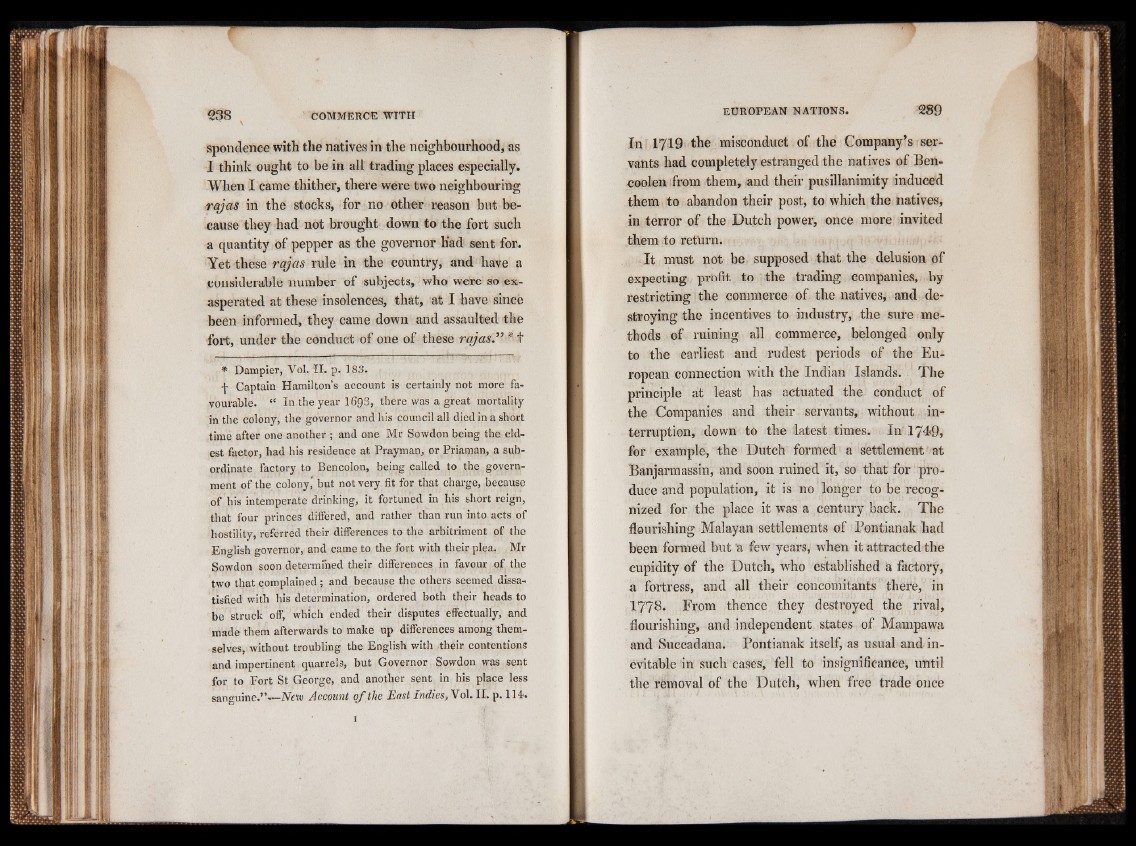
spondence with the natives in the neighbourhood, as
I think ought to be in all trading places especially.
When I came thither, there were two neighbouring
rajas in the stocks, for no other reason but because
they had not brought down to the fort such
a quantity of pepper as the governor had sent for.
Yet these rajas rule in the country, and have a
considerable number of subjects, who were so exasperated
at these insolences, that, at I have since
been informed, they came down and assaulted the
fort, under the conduct of one of these rajas.” * f
* Dampier, Vol. II. p. 183.
•j* Captain Hamilton’s account is certainly not more favourable.
“ In the year 1693, there was a great mortality
in the colony, the governor and his council all died in a short
time after one another ; and one Mr Sowdon being the eldest
factor, had his residence at Prayman, or Priaman, a subordinate
factory to Bencolon, being called to the government
of the colony^ but not very fit for that charge, because
of his intemperate drinking, it fortuned in his short reign,
that four princes differed, and rather than run into acts of
hostility, referred their differences to the arbitriment of the
English governor, and came to the fort with their plea, Mr
Sowdon soon determined their differences in favour of the
two that complained; and because the others seemed dissatisfied
with his determination, ordered both their heads to
be struck off, which ended their disputes effectually, and
made them afterwards to make up differences among themselves,
without troubling the English with their contentions
and impertinent quarrels, but Governor Sowdon was sent
for to Fort St George, and another sent in his place less
sanguine.”—New Account o f the East Indies, Vol. II. p. 114;.
In 1719 the misconduct of the Company’s servants
had completely estranged the natives of Ben-
coolen from them, and their pusillanimity induced
them to abandon their post, to which the natives,
in terror of the Dutch power, once more invited
them to return.
It must not be supposed that the delusion of
expecting profit to the trading companies, by
restricting the commerce of the natives, and destroying
the incentives to industry, the sure methods
of ruining all commerce, belonged only
to the earliest and rudest periods of the European
connection with the Indian Islands. The
principle at least has actuated the conduct of
the Companies and their servants, without interruption,
down to the latest times. In 174*9,
for example, the Dutch formed a settlement at
Banjarmassin, and soon ruined it, so that for produce
and population, it is no longer to be recognized
for the place it was a century back. The
flourishing Malayan settlements of Pontianak had
been formed but 'a few years, when it attracted the
cupidity of the Dutch, who established a factory,
a fortress, and all their concomitants there, in
1778. From thence they destroyed the rival,
flourishing, and independent states of Mampawa
and Succadana. Pontianak itself, as usual and inevitable
in such cases, fell to insignificance, until
the removal of the Dutch, when free trade once